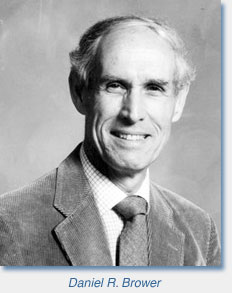 Daniel R. Brower, historian of Russia, Europe, and the modern world, died on February 27, 2007. He is survived by his wife Françoise and his daughters Caroline and Valerie and their families. A well-attended commemorative gathering of March 18, 2007, on the University of Californais at Davis campus recalled Dan Brower as father and husband, friend, teacher, and scholar. He was a member of the UC-Davis Department of History for 38 years, retiring in July 2006. As a lecturer, the creative and indefatigable Dan Brower’s linguistic and dramatic gifts and striking presence made him a popular figure in undergraduate eyes, especially after he pioneered the teaching of world history at Davis by the introduction of a well-attended lower-division course on the 20th-century world. Dan Brower also taught a wide-ranging, sophisticated, and popular set of courses in Russian history. At the graduate level, he advanced the teaching of methodological and historiographical courses, while training a number of gifted PhD students whose subsequent teaching and research careers do honor to him. Dan Brower also stoically and expertly served as department chair, steering his vessel on an even keel through turbulent bureaucratic waters.
Daniel R. Brower, historian of Russia, Europe, and the modern world, died on February 27, 2007. He is survived by his wife Françoise and his daughters Caroline and Valerie and their families. A well-attended commemorative gathering of March 18, 2007, on the University of Californais at Davis campus recalled Dan Brower as father and husband, friend, teacher, and scholar. He was a member of the UC-Davis Department of History for 38 years, retiring in July 2006. As a lecturer, the creative and indefatigable Dan Brower’s linguistic and dramatic gifts and striking presence made him a popular figure in undergraduate eyes, especially after he pioneered the teaching of world history at Davis by the introduction of a well-attended lower-division course on the 20th-century world. Dan Brower also taught a wide-ranging, sophisticated, and popular set of courses in Russian history. At the graduate level, he advanced the teaching of methodological and historiographical courses, while training a number of gifted PhD students whose subsequent teaching and research careers do honor to him. Dan Brower also stoically and expertly served as department chair, steering his vessel on an even keel through turbulent bureaucratic waters.
Brower received the PhD degree from Columbia University, with its famed program in Russian history. But his first engagement with European history was in the French field, in which he published his innovative first book, The New Jacobins: The French Communist Party and the Popular Front (1968). Brower’s fluent and elegant French found daily exercise in conversation with Françoise, with whom he arrived as an assistant professor in Davis. Brower spoke an equally excellent Russian, which made him a rare trilingualist at the level of everyday speech. In the Russian field, apart from many influential articles published in top journals, he wrote enduringly read and oft-cited books:Training the Nihilists: Education and Radicalism in Tsarist Russia (1975),The Russian City between Tradition and Modernity, 1850–1900 (1989), Turkestan and the Fate of the Russian Empire (2003), while also co-editing a pioneering work on Russian imperialism,Russia’s Orient: Imperial Borderlands and Peoples, 1700–1917 (1997). In addition to writing several teaching works in Russian history, Brower’s textbook, The World in the Twentieth Century: From Empires to Nations, first published in 1988, proved a great success, remaining in print with Prentice Hall through several revisions to the present day. In recent years, Brower continued to make research trips to the former Soviet Union, especially to its former provinces in the sunny and exotic Black Sea and Caucasian regions, and remained at work on questions of Russian imperialism.
His talents and hard work resulted in a richly productive career and an international reputation as a first-rank scholar. Many will remember him as a good-humored tennis and bridge-player, first-rate hiker, and explorer of nature’s wilds. He was capable of diving from the prows of yachts straight into chilly San Francisco Bay, and of kayaking through Alaskan waters. His memory will live in the minds of the thousands of students who took his classes. He was an excellent friend and colleague of many in the University of California and the profession at large. We salute Dan Brower’s memory with affection and respect.
William W. Hagen, Ted W. Margadant, and Don C. Price
University of California at Davis